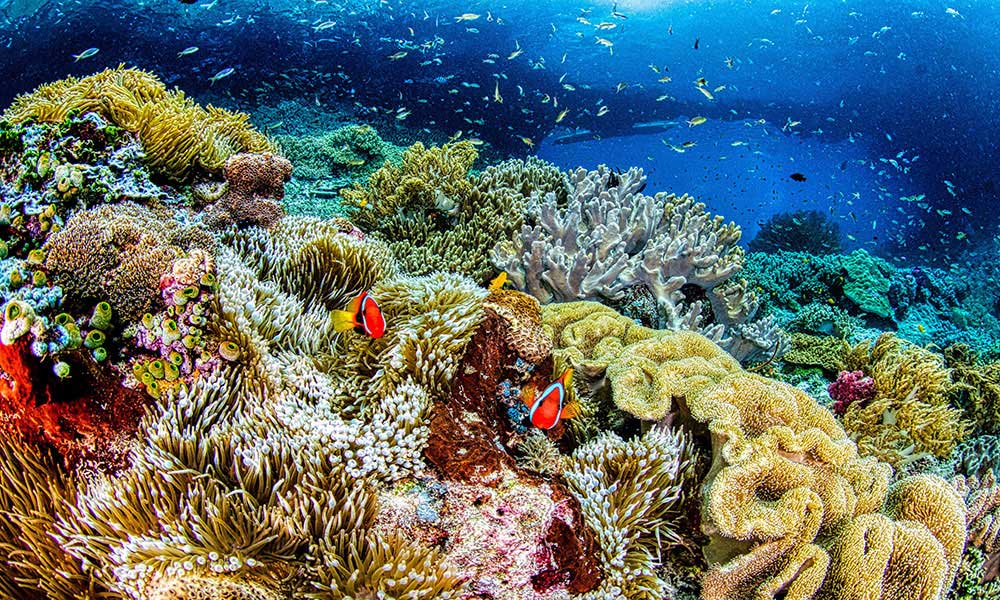Marine Ecosystems
Marine ecosystems are the lungs of our planet, producing half of the oxygen we breathe and providing a third of the food we eat.

Marine ecosystems are intricate and varied systems that span more than 70% of the Earth's surface. They consist of a wide range of habitats, such as coral reefs, estuaries, kelp forests, open ocean waters, and polar regions. These ecosystems are home to approximately 226,000 identified species, with scientists estimating that up to 75% of marine species are yet to be discovered. Marine ecosystems are essential for regulating the Earth's climate, producing half of the oxygen we breathe, and acting as a vital food source for billions of individuals. Additionally, they aid in the absorption of carbon dioxide, counteracting ocean acidification, and safeguarding coastlines against erosion and storm damage.
Our Project
Vision
Spectral Lab’s extensive collection of optical sensors and spectral data has allowed them to amass a wealth of images from ocean environments, offering invaluable insights into the complex dynamics of marine ecosystems. However, analyzing these images manually is a time-consuming task. This is where SOLIDS Lab comes in. By automating the detection of kelp and sea urchins in vast ocean image datasets, our innovative tool aims to accelerate and enhance marine conservation efforts. Together, we are committed to advancing our understanding of marine ecosystems and ensuring a sustainable and biodiverse future for our planet.Our Role
SOLIDS Lab takes the lead in this collaboration, breaking the project down into three components:- Data Labeling and Cleaning: We label and clean the extensive image dataset provided by Spectral Lab. This step is pivotal to ensure the accuracy of the AI model’s training data.
- Model Development: Additionally, we are developing a state-of-the-art image detection model designed to identify and differentiate between kelp and sea urchins, providing an essential tool for ocean research.
- User-Friendly Interface: Finally, we are continuously refining the UI to provide an easy-to-use interface that is accessible even to those with little-to-no technical experience.
This project intends to create machine learning methods and a secure underwater communication suite to track and comprehend the impacts of environmental stresses on Canada’s blue carbon ecosystems. In particular, the Project aims to detect patterns and trends in stressor effects on these ecosystems and the dependent aquatic species by analyzing data from numerous sensor nodes. Data availability and integrity will be guaranteed through the creation of a secure underwater sensor suite, and the security threats present within the sensor network will be quantified by vulnerability assessment. The Project is expected to provide a thorough machine learning-based ecosystem monitoring system, a better understanding of the impacts of stressors, a real-time monitoring software system, a secure underwater sensor suite, and information on vulnerability exploitation. In general, the goal of the Project is to support efficient ecosystem management and the preservation of blue-carbon ecosystems.
Coming Soon…
Creating a device to monitor ocean pH levels is a crucial step in understanding the impact of ocean acidification on marine life, especially coral reefs. The ocean pH monitoring project serves as a catalyst for positive change by providing essential data for environmental decision-making, raising national awareness about ocean conservation through education and media campaigns, and fostering inclusivity in the environmental sector by actively engaging communities and promoting accessibility to information and participation. Through these efforts, the project contributes to building a more sustainable and resilient relationship between humanity and the oceans.
The ocean pH monitoring project has the potential to catalyze positive change for the environment, enhance national awareness of ocean conservation, and promote inclusivity in the environmental sector in several ways:
Environmental Impact:
- Early Detection and Mitigation: By providing real-time and accurate data on ocean pH levels, the monitoring device allows for early detection of changes. This information is crucial for implementing timely mitigation strategies to counteract the effects of ocean acidification on marine life, especially coral reefs. This proactive approach can contribute to preserving ecosystems and promoting biodiversity.
- Informed Conservation Efforts: The collected data can inform targeted conservation efforts, helping policymakers and environmental organizations make evidence-based decisions. Understanding the dynamics of ocean pH levels allows for the development of effective strategies to combat climate change and its impact on marine ecosystems.
National Awareness:
- Educational Outreach: The project provides an opportunity for educational outreach programs aimed at increasing public awareness of ocean conservation. Workshops, seminars, and educational materials can be developed to inform communities about the importance of maintaining a balanced pH in the oceans for the health of marine life.
- Media Campaigns: Leveraging media channels, including social media, documentaries, and news outlets, can help disseminate information about the project’s findings and the broader issues of climate change, ocean acidification, and their impact on marine ecosystems. This outreach fosters a sense of responsibility and encourages collective action.
The “Marine Sentinel” project is chosen to address a critical and often overlooked aspect of ocean conservation: oil spill detection and response. Oil spills pose a severe threat to marine ecosystems, affecting a wide range of species, from microscopic plankton to large marine mammals, and have long-term impacts on the health of our oceans. By focusing on this issue, we aim to mitigate one of the major environmental challenges affecting our oceans.
Alignment with OAG Target Areas:
- Overfishing: While the primary focus of “Marine Sentinel” is on oil spill detection, it indirectly contributes to the fight against overfishing. Healthy marine ecosystems are crucial for maintaining fish populations. Oil spills can devastate these ecosystems, further exacerbating the problem of overfishing as fish stocks decline.
- Climate Change: Oil spills contribute to the deterioration of marine environments, affecting their ability to sequester carbon effectively. By preventing and rapidly responding to oil spills, “Marine Sentinel” aids in preserving the ocean’s role in regulating the Earth’s climate.
Impact on Environment and Awareness
Positive Environmental Change:
- Rapid Response: By enabling quick detection of oil spills, “Marine Sentinel” minimizes the environmental impact of such events, preserving marine life and habitats.
- Data Collection: Continuous monitoring provides valuable data for environmental research, helping to understand and mitigate the broader impacts of oil spills on marine ecosystems.
National Awareness of Ocean Conservation:
- Educational Outreach: The project will include initiatives to educate the public and stakeholders about the importance of ocean conservation and the dangers posed by oil spills.
- Collaboration with Media: Partnering with media outlets to cover oil spill incidents and responses raises awareness about the fragility of marine ecosystems and the importance of their protection.
Promoting Inclusivity in Environmental Sector:
- Community Involvement: Engaging local communities, particularly those in coastal areas, in monitoring efforts, and response activities, fostering a sense of stewardship and inclusivity.
- Accessible Technology: Efforts will be made to ensure that the technology and data are accessible to a broad audience, including educational institutions, local governments, and environmental organizations, regardless of their resources.
In summary, “Marine Sentinel” not only addresses a specific environmental issue but also contributes to broader ocean conservation efforts. Its impact extends beyond the immediate mitigation of oil spills, fostering a culture of environmental awareness and stewardship, and providing tools and data crucial for the sustainable management of marine resources.

